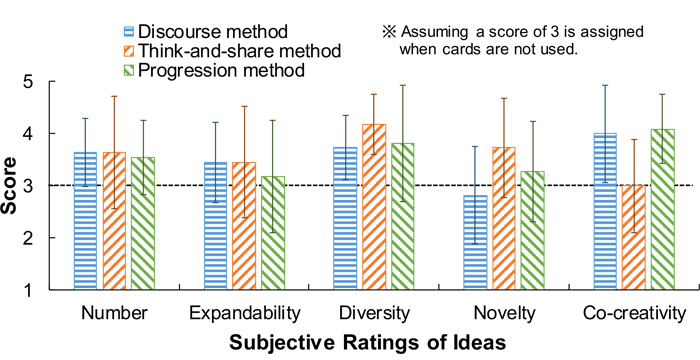Encouraging divergent thinking by using and combining 40 types of phenomena, characteristics, and mechanisms of organisms

Fig. 1. IKIMONO Inspiration Cards (prototype).

Fig. 2. Participants using the cards in a workshop.

Fig. 1. IKIMONO Inspiration Cards (prototype).

Fig. 2. Participants using the cards in a workshop.
October 15, 2019
Hitachi, Ltd. today announced its newly developed "IKIMONO Inspiration Cards" (Fig. 1) inspired by various phenomena, characteristics, and mechanisms of organisms and supporting drastic ideation toward innovative societal systems that solve societal issues. These cards enable users to support innovative ideation not found in existing societal systems by combining from various spheres 40 types of phenomena, characteristics, and mechanisms of organisms (Fig. 2). Using these cards, Hitachi will support societal systems and contribute to solving complex societal issues.
IKIMONO Inspiration Cards have a double-sided configuration; on one side ("biological side"), a phenomenon, characteristic, or mechanism of an organism is described, and on the other side ("system side"), a question to promote ideation for societal systems and examples of application are described. The double-sided configuration enables users to promote ideation for societal systems smoothly from phenomena, characteristics, and mechanisms of organisms. In addition, the cards are categorized into three biological types(1) and four system types,(2) and the categories help users select and combine cards depending on characteristics of societal issues and/or customers’ problems.
The biological side of the cards was developed as follows. First, 146 phenomena, characteristics, and mechanisms of organisms were taken from various fields of biology such as molecular biology and ecology. Next, of these 146 attributes, 40 were selected in consideration of their validity and balance in field selection according to the chapter structure of "Campbell Biology."(3) Then, non-expert-friendly cards were developed by adding understandable phrases and illustrations, which help non-experts in biology understand the phenomena, characteristics, and mechanisms of organisms (Fig.3). In consideration of the validity of the phenomena, characteristics, and mechanisms in the cards, the descriptions concerning the categories of "genetics and evolution" and "ecology" were curated by experts in biology(4) from Kyoto University.

Fig. 3. Examples of IKIMONO Inspiration Cards. Left: Biological Side Right: System Side
Enlarge (Open in new window)
To evaluate the efficacy of the developed cards, an experimental workshop was held with system researchers. In the workshop, participants (including system researchers) used ideas taken from phenomena, characteristics, and mechanisms of organisms to brainstorm(5) about societal systems with the cards through three ideation methods; (A) using cards in the middle of a group discourse ("discourse method"), (B) thinking individually using the cards and then sharing and discussing ideas with other participants ("think-and-share method"); and (C) sequentially adding cards as the discussion progressed ("progression method").
From the results of ratings relating to the generated ideas (Fig. 4), the scores for number of ideas and diversity among ideas were both significantly higher than the standard score for all ideation methods. Therefore, it was validated that the developed cards enable non-experts in biology to draw upon phenomena, characteristics, and mechanisms of organisms and come up with ideas for societal systems.
Comparing the ideation methods, it was shown that the think-and-share method strongly promoted innovative ideation, while the discourse and progression methods promoted more collaborative ideation. Accordingly, it was validated that consideration of number of participants and/or purpose of use in devising an ideation method is effective for generating desirable ideas.
In addition, participants answered that appropriate card selection by a facilitator would promote expandability and co-creativity for ideation, and that the cards would also be effective as a training tool for individuals performing ideation. Therefore, it was suggested that improving ideation methods would contribute to greater versatility in how the cards are used.

Fig. 4. Results of subjective ratings of ideas generated by three ideation methods using IKIMONO Inspiration Cards.
For more information, use the enquiry form below to contact the Research & Development Group, Hitachi, Ltd. Please make sure to include the title of the article.